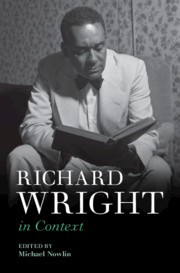Book contents
- Richard Wright in Context
- Richard Wright in Context
- Copyright page
- Contents
- Figures
- Contributors
- Abbreviations
- Richard Wright’s Works: A Chronology
- Introduction Richard Wright’s Luck
- Part I Life and Career, Times and Places
- Part II Social and Cultural Contexts
- Chapter 6 Black Masculinity
- Chapter 7 Wright and African American Women
- Chapter 8 He Tried to Be a Communist
- Chapter 9 Liberalism and the Color Line
- Chapter 10 “The Same Stuff”
- Chapter 11 Moviegoers and Cinematic Seers in Wright’s Fiction
- Chapter 12 Clothing
- Chapter 13 “Defeat Measured in the Jumping Cadences of Triumph”
- Chapter 14 Wright and Religion
- Chapter 15 Bandung and Third-World Liberation
- Chapter 16 Black Paris, Hard-Boiled Paranoia, and the Cultural Cold War
- Part III Literary and Intellectual Contexts
- Part IV Reputation and Critical Reception
- Index
Chapter 8 - He Tried to Be a Communist
Wright and the Black Literary Left
from Part II - Social and Cultural Contexts
Published online by Cambridge University Press: 08 July 2021
- Richard Wright in Context
- Richard Wright in Context
- Copyright page
- Contents
- Figures
- Contributors
- Abbreviations
- Richard Wright’s Works: A Chronology
- Introduction Richard Wright’s Luck
- Part I Life and Career, Times and Places
- Part II Social and Cultural Contexts
- Chapter 6 Black Masculinity
- Chapter 7 Wright and African American Women
- Chapter 8 He Tried to Be a Communist
- Chapter 9 Liberalism and the Color Line
- Chapter 10 “The Same Stuff”
- Chapter 11 Moviegoers and Cinematic Seers in Wright’s Fiction
- Chapter 12 Clothing
- Chapter 13 “Defeat Measured in the Jumping Cadences of Triumph”
- Chapter 14 Wright and Religion
- Chapter 15 Bandung and Third-World Liberation
- Chapter 16 Black Paris, Hard-Boiled Paranoia, and the Cultural Cold War
- Part III Literary and Intellectual Contexts
- Part IV Reputation and Critical Reception
- Index
Summary
Richard Wright’s was truly a life defined by struggle, and by his death at age fifty-two in 1962, he had acquired a massive amount of political baggage that was bursting with a contradictory array of statements and actions. Among other things, Wright stands alone among African American authors of fiction, poetry, and drama in his providing a detailed, autobiographical memoir of life in the Communist Party (CP-USA), which lasted about ten years. Moreover, Wright scholars have long been aware that there was always something elliptical if not cryptic about the articulation of Wright’s political views in the years after his departure from that movement and the United States. This essay begins by demonstrating that much of the present-day confusion regarding Wright’s brand of Marxist politics toward the mid-1940s and after can be traced back to interpretations of what he resolved when he wrote the memoir “I Tried to Be a Communist.” It concludes by querying the extent to which his political evolution was representative--or uncharacteristic--of the experience of the dozens of African American imaginative writers with CP-USA affiliations, every last one of whom drew back from the organization at some point.
- Type
- Chapter
- Information
- Richard Wright in Context , pp. 87 - 97Publisher: Cambridge University PressPrint publication year: 2021
- 1
- Cited by

